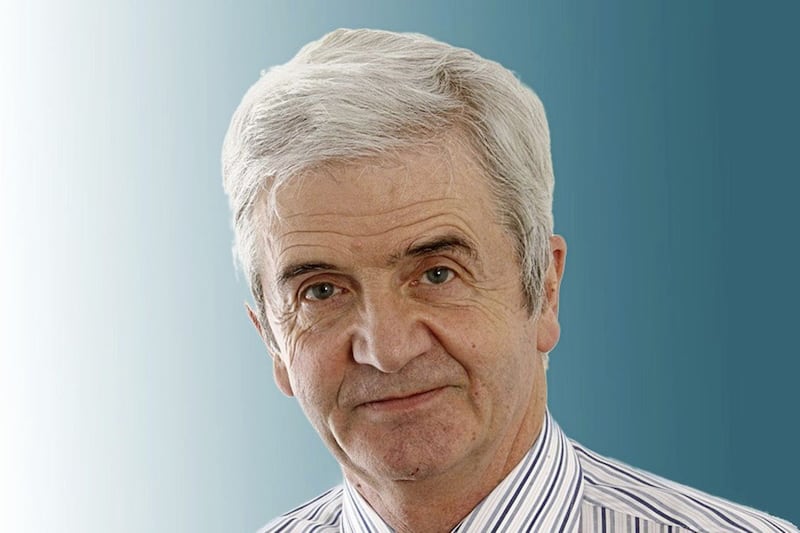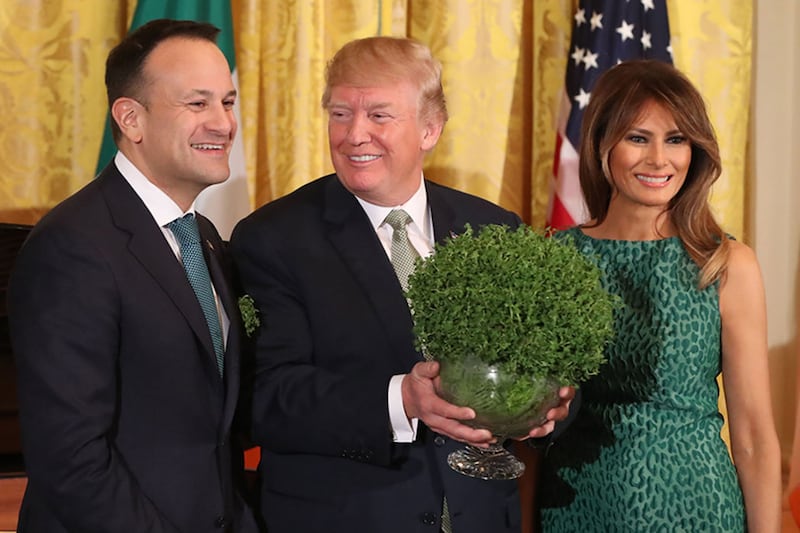England's difficulty may not quite be Ireland's opportunity right now, but Theresa May's problems over Brexit have certainly created political opportunities for parties and individuals within Ireland's rapidly changing political landscape.
Her dithering over the nature of the post-Brexit border will almost certainly allow Leo Varadkar to win the next election, probably propel Sinn Féin into government in Dublin and possibly make Nigel Dodds the next leader of the DUP. On this St Patrick's Day, every English cloud has a subtle Irish lining.
The fear of a hard border has unified nationalism, by substituting "Brits Out" with "Brexit Out". The undoubted leader of this new nationalism is Leo Varadkar, who has been a stern critic of Britain and, on occasion, unionism.
Like Daniel O'Connell before him, he is now the uncrowned king of Ireland, leading what is in effect a national (or at least a nationalist) popular movement. Whereas O'Connell defined nationalism in terms of Catholicism, Varadkar has re-defined Irishness in economic terms, by opposing a hard economic border.
His anti-British rhetoric is a huge departure for the Irish government and Fine Gael, which have traditionally been slow to criticise Britain. He has cleverly identified the British as the common enemy and his Strategic Communications Unit (at an annual cost of €5 million) has placed him personally at the centre of everything which is good, wholesome and above all Irish.
This has pushed his popularity to a level not seen since Bertie Ahern's days (which may not be a good thing in the long run, but never mind).
He went too far when he used the launch of the National Development Plan to confuse news with party political advertising, through the use of paid "advertorials" in many newspapers. As a result, he may now have to disband his communications unit, but he will still have Brexit as his rallying cry.
So, barring political catastrophe during the abortion referendum or a scandal within his cabinet (and scandal tends to be more at home in religion than politics in Ireland) Leo will be the next taoiseach for a five-year term.
Opinion polls suggest that he will be able to form a coalition without Fianna Fáil's current confidence and supply arrangement. That leaves Sinn Féin at the head of the coalition queue.
It is an opportunity which SF has been working on for some time, largely unnoticed by the Dublin media. You may wish to raise the delicate matter of a party claiming to be socialist preparing for coalition with an increasingly right wing Fine Gael which has invited Donald Trump to Ireland.
However, the Labour Party has already been there and done that (and subsequently disappeared as an electoral force). Despite that, Mary Lou McDonald said in her leadership acceptance speech that SF would now use innovative and modern ways in advancing their politics (presumably meaning entering coalition) and that it would transcend class. (That's the problem with socialism - it tends to attract the wrong class of person.)
So while Fianna Fáil criticised the National Development Plan as the re-hash of old ideas and money already allocated, SF took a more reserved position. Although, in fairness, Mary Lou has criticised the taoiseach's choice of socks
It was to please, or at least impress, Leo Varadkar, that SF was willing to return to what would have been the status quo at Stormont. The party's only gain was the appointment of an Irish language commissioner. Leo needs a northern authoritative voice to support him on Brexit and SF was happy to fulfil that role in preparation for government in Dublin. (Tiocfaidh ár Leo?)
But in this new era of rampant nationalism, unionism pulled up the drawbridge and retreated to the comfort of Westminster's leather benches.
That leaves Arlene Foster as the party's non-playing captain. In the long term she is likely to become redundant, possibly making Nigel Dodds the next leader - if he wants the job. He certainly appears to have little opposition in the ability stakes.
Of course, the big question is what sort of border will we get. The answer will determine Ireland's economy, north and south, but it will also shape Irish politics for some time to come. It looks like we will have pan-nationalism facing absentee unionism - which leaves Irish unity and normal politics further away than ever.
As the north's schools go bankrupt and the state abandons its responsibility to adequately fund our education service, it is clear that both nationalism and unionism have failed society here. So while England's difficulty is interesting to observe, it offers little opportunity to promote the laughter of our children.








